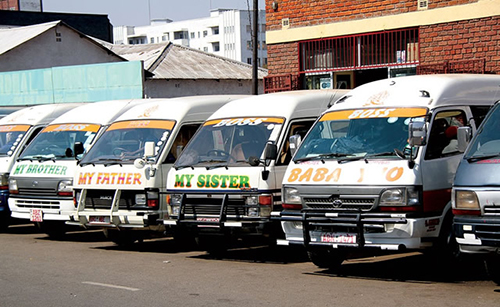Legal operating systems for kombis on cards
Private-owned commuter omnibuses have been given the green light to operate while the Government works on a regulatory legislation which will govern their conduct.
This follows the recent lifting of a ban on private players in the public transport sector by President Mnangagwa.
In his announcement on May 7, this year the President announced the lifting of the ban coupled with benefits from a duty-free importation scheme for buses valid for a year.
The President said this while addressing the nation on measures adopted by the Government to restore confidence in the economy following unjustified price hikes recently.
Clarifying on the issue of commuter omnibuses popularly known as “kombis”, Local Government and Public Works Minister July Moyo said commuter omnibus operators have been allowed to operate by the President.
He added that the Government is putting together legislation to govern their operation.
Private transport operators were banned since the first Covid-19 induced lockdown in March 2021 and only transport operators affiliated to ZUPCO were allowed operate by the Government Chairperson of Bindura commuter omnibuses operators Mr Edmore Mutseketu welcomed the lifting of the ban on kombis.
He called on the Government to include various acts in the regulatory framework that affect public transport, such as the legal relationships between the transport operators, the Government and passengers .
He appealed to the Government to create a platform for dialogue and give people a grace period instead of abruptly imposing bans.
“Commuter omnibuses are an investment. I had eight good kombis which are now shells from inactivity. The ban inconvenienced all the operators and we now need to retool and buy new fleets.
“We appeal to the Government for a waiver on the ban on the importation of 10 year-old vehicles. We also need relaxation on import duty to promote the coming in of vehicles for an effective public transport system.”
He added that setting up of association and public administration bodies will bring sanity in the operation of kombis.
“Commuter-omnibus operators are capable of organising themselves and ensure that sanity prevails as long as they have collaboration with the Government and the police,” he said.
“We need to copy models of transport systems in our neighbouring countries. It is possible for kombi operators to restore professionalism and confidence in the public.
“In 2019, our association working with Bindura Municipality managed to set up a system where there was order and elimination of touts.”
Unfortunately this system was met with hostility from the police who said they were not a law enforcing agency.
He said some people benefited from the chaotic state of kombis.
Mr Mutseketu said the ban on kombis gave birth to pirate taxes known as “mushikashika.”
He said these must be eradicated to entice bona fide operators to resume duty.
“He cannot compete with pirate taxes who had been on the roads for the duration of the ban. We need powers to control who operates on the road and how, working with the police.
“Local authorities must provide ranks designated for kombis.”
Speaking on unruly behaviour by kombi conductors Mr Mutseketu said self-regulatory will ensure that we create vetting and training companies which recommend and blacklist people.
He said touts are attracted by disordered people. Each kombi wants to go first. Mr Mutseketu appealed to the Government to decentralize issuance of operating license and route authority to eradicate corruption.
Another kombi operator Ms Adija Muchenga said periodic stakeholder engagement and negotiations with the Government is key as they go back on the road.
“The unilateral ban was harsh and affected us women entrepreneurs. We lost our investment, income and we were reduced from a business person to paupers overnight,” she said.
“We need legal operating systems to protect our interest and those of the Government.
The police and local authorities should align to the law so that they don’t view us as their milk cows.
“We need a proper designated pick up and drop off point the way Zupco is operating to eradicate touts. The law must include stiffer penalties for pirate taxes.”
The ban had ripple effects on the economy and our employees, some of whom resorted to drug abuse.
She said lifting of the ban will reduce drug abuse and create employment for the youths.
“We sold our vehicle at a give away price because we were not sure of the future, while the parked vehicles have depreciated. I appeal to the Government to assist with soft loans so that we can service and bring back roadworthy vehicles back on the roads,” she said.
Mr Richard Phiri appealed to kombi to exercise professionalism and respect when they go back on the roads.
“Kombis need a code of conduct because they are characterized by unruly behaviour and flaunting of road regulations. They need to abide by the law and code of conduct,” he said. “The owners employ unqualified people because they want cheap labour. They should stick to theirroute permits not to go everywhere.
“The law must penalise the kombi owner on indiscipline of their employees. They need to wear branded clothes for identification.”-The Herald











